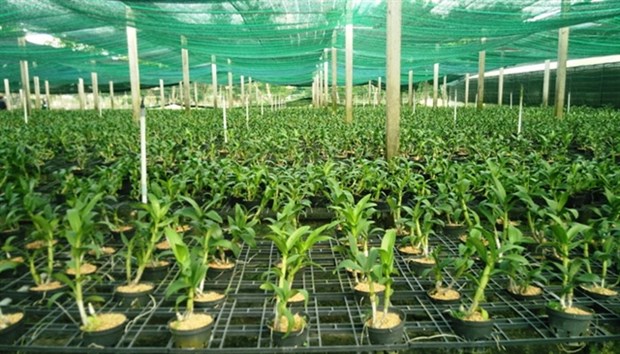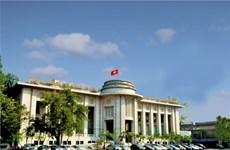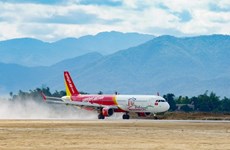HCM City to build plant variety, animal breeding centres
Farmers and experts have asked Ho Chi Minh City authorities to remove hindrances and create favourable conditions for residents to build greenhouses and breeding centres on agricultural land used to build nursery gardens.
 A greenhouse in Ho Chi Minh City (Photo: VNA)
A greenhouse in Ho Chi Minh City (Photo: VNA) HCM City (VNS/VNA) - Farmers and experts have asked Ho Chi Minh City authorities to remove
hindrances and create favourable conditions for residents to build greenhouses
and breeding centres on agricultural land used to build nursery gardens.
Du Huy Quang, head of the land management division under the HCM City Department of Mineral Resources and Environment, said the Land Law of Vietnam allows building of agricultural support facilities such as glasshouses and greenhouses on agricultural land typically used to build nursery gardens.
However, farmers faced challenges in transferring land-use purposes, Quang said at a seminar held by the HCM City People’s Council and HTV recently.
According to Pham Kim Bang, manager at the Business Licensing Division under the HCM City Department of Construction, the Construction Department has drafted instructions on construction of agricultural support facilities, which includes two categories of construction works.
The first category includes works that provide nets and favourable conditions for plant varieties and breeding animals. Construction of these works, which use removable materials, must be reported to commune People’s Committees.
Sentry boxes at these nursery gardens must be built with environmentally friendly materials such as trees and thatch. They must have one storey and be under 15m wide and 6m high, with total area of less than 1,000 sq.m.
Sustainable development
According to figures released by the HCM City Department of Agriculture and Rural Development, the city has about 114,000 ha of agricultural land, nearly half of the city’s total land area. It includes about 66,000ha for agricultural production; 35,684 ha for silviculture; and 10,798 ha for aquaculture. The city also has more than 25,300 farming households.
Duong Duc Trong, deputy director of HCM City Department of Agriculture and Rural Development, said after nearly 10 years’ operation of the city’s urban agricultural development project, the areas under hi-tech agricultural production had been expanded.
The per capita income of these farmers rose from 25 million VND (over 1,090 USD) per year in 2011 to 63 million VND in 2019, Trong said.
The city has 130 agricultural cooperatives and is expected to build two to three hi-tech agricultural zones with expected revenues of 900 million VND for each ha of land, and projected per capita income of 100 million VND (4,291 USD) for residents in rural areas, according to Trong.
Dinh Minh Hiep, head of the management board of the HCM City’s Hi-tech Agricultural Park, said that urban agriculture would be developed with a modern concept of sustainable development, with a focus on the use of hi-tech industries and bio-technologies.
Hiep said the city would build centres for plant varieties and animal breeding which would be provided to southern provinces in Vietnam and neighbouring countries including Cambodia, Laos and Thailand./.
Du Huy Quang, head of the land management division under the HCM City Department of Mineral Resources and Environment, said the Land Law of Vietnam allows building of agricultural support facilities such as glasshouses and greenhouses on agricultural land typically used to build nursery gardens.
However, farmers faced challenges in transferring land-use purposes, Quang said at a seminar held by the HCM City People’s Council and HTV recently.
According to Pham Kim Bang, manager at the Business Licensing Division under the HCM City Department of Construction, the Construction Department has drafted instructions on construction of agricultural support facilities, which includes two categories of construction works.
The first category includes works that provide nets and favourable conditions for plant varieties and breeding animals. Construction of these works, which use removable materials, must be reported to commune People’s Committees.
Sentry boxes at these nursery gardens must be built with environmentally friendly materials such as trees and thatch. They must have one storey and be under 15m wide and 6m high, with total area of less than 1,000 sq.m.
Sustainable development
According to figures released by the HCM City Department of Agriculture and Rural Development, the city has about 114,000 ha of agricultural land, nearly half of the city’s total land area. It includes about 66,000ha for agricultural production; 35,684 ha for silviculture; and 10,798 ha for aquaculture. The city also has more than 25,300 farming households.
Duong Duc Trong, deputy director of HCM City Department of Agriculture and Rural Development, said after nearly 10 years’ operation of the city’s urban agricultural development project, the areas under hi-tech agricultural production had been expanded.
The per capita income of these farmers rose from 25 million VND (over 1,090 USD) per year in 2011 to 63 million VND in 2019, Trong said.
The city has 130 agricultural cooperatives and is expected to build two to three hi-tech agricultural zones with expected revenues of 900 million VND for each ha of land, and projected per capita income of 100 million VND (4,291 USD) for residents in rural areas, according to Trong.
Dinh Minh Hiep, head of the management board of the HCM City’s Hi-tech Agricultural Park, said that urban agriculture would be developed with a modern concept of sustainable development, with a focus on the use of hi-tech industries and bio-technologies.
Hiep said the city would build centres for plant varieties and animal breeding which would be provided to southern provinces in Vietnam and neighbouring countries including Cambodia, Laos and Thailand./.













